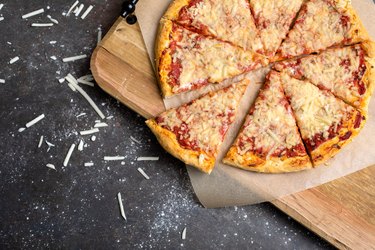
If you have had your gallbladder removed, you may notice some changes in your digestion and you will need to alter your diet. Find out which foods to avoid after gallbladder surgery, as well as foods to incorporate into your diet to help you heal and feel your best.
Tip
You will need to avoid fatty foods for a few months after gallbladder surgery, but most people can slowly add them back in to their diet. Look at the food labels and make sure you are eating foods that have no more than 3 grams of fat per serving.
Video of the Day
What Does the Gallbladder Do?
The gallbladder is a small organ located beneath the liver on your right side. It functions to secrete and store the bile that is made in your liver and also helps you digest fatty foods. According to the Cleveland Clinic, more than 600,000 people have their gallbladders removed each year.
Video of the Day
Why would someone have their gallbladder removed? For those who have pain, often due to hard deposits of digestive fluid called gallstones, they need to have their gallbladders removed. The Cleveland Clinic says that the gallbladder is not considered a "necessary" organ, as your liver will continue making the bile it needs for digestion if the gallbladder is removed. However, there are dietary changes that need to be made after surgery to help with healing.
Read more: Foods to Relieve a Gallbladder Attack
Foods to Avoid After Surgery
There are certain foods to avoid after gallbladder surgery, since your gallbladder isn't releasing bile to aid in the digestion of fat. Don't worry, your liver is still there to do the job; however your body needs time to adjust.
According to a July 2014 study in the Journal of the Academy of Nutrition and Dietetics, you need to limit your fat intake for several months to allow your liver time to get acclimated.
Once you start adding fat back in your diet, do so gradually. This means you need to limit fried foods, high fat meats, french fries, high fat dairy like milk and cheese, pizza, chocolates and gravies. As a guideline, the Cleveland Clinic says to eat foods that have no more than 3 grams of fat per serving.
In addition to limiting fat, other foods to avoid after gallbladder surgery — especially if you have an issue with reflux — include alcohol, caffeinated or carbonated drinks, spicy foods or citrus foods. Eat smaller meals throughout the day to allow your body to adjust.
Foods to Eat After Surgery
You know which foods to avoid after gallbladder surgery, so what foods can you actually eat? The Journal of the Academy of Nutrition and Dietetics says that it is important to eat foods with fiber to help bind the bile in your stomach, but add fiber in slowly to avoid diarrhea or bloating. Some examples of high-fiber foods include whole-grain bread, cereal and nuts.
In addition, it is important to eat vegetables after gallbladder surgery. A July 2018 article in the Korean Journal of Internal Medicine says that those ate more vegetables and less high fat foods had fewer signs of complications after gallbladder surgery. Vegetables such as Brussels sprouts, broccoli, cauliflower and cabbage are great options because they are also high in fiber.
Read more: Low-Fat, Low-Carb Food Can Taste Good
Signs of Gallbladder Surgery Complications
It is important to be aware of side effects and signs of complications, such as sharp pain in right side after gallbladder surgery or bloating.
One common side effect after gallbladder surgery is diarrhea; however the Mayo Clinic says it should last no more than a few weeks. Talk to you doctor to make sure it is not indicative of signs of complication after gallbladder surgery. Making dietary changes can help, too.
In addition to eating low fat meals, add soluble fiber such as oats and barley to your diet and eat smaller meals throughout the day. Incorporate lean protein into your diet, such as salmon, along with plenty of vegetables. Limit caffeine, dairy and sweet foods until your diarrhea subsides.
What if you have sharp pain in right side after gallbladder surgery? The Journal of Nutrition and Dietetics says that this symptom, along with nausea and bloating, could be a sign of post-cholecystectomy syndrome (PCS), so it is important you let your doctor know immediately. The Cleveland Clinic indicates this symptom could also indicate a bile duct injury, so make sure your doctor is aware.
In addition to the sharp pain in right side after gallbladder surgery, let your provider know if you have persistent pain, fever, chills or jaundice. Last, if you are unable to have a bowel movement or pass gas for three days after surgery, it could indicate a problem that needs to be discussed with your doctor.
- Cleveland Clinic: "What to Eat After You Have Your Gallbladder Removed"
- Journal of the Academy of Nutrition and Dietetics: "What Medical Nutrition Therapy Guideline Is Recommended Post-Cholecystectomy?"
- Korean Journal of Internal Medicine: "Association Between Dietary Intake and Postlaparoscopic Cholecystectomic Symptoms in Patients With Gallbladder Disease"
- Mayo Clinic: "Gallbladder Removal Diet"
- Cleveland Clinic: "Bile Duct Injuries During Gallbladder Surgery"